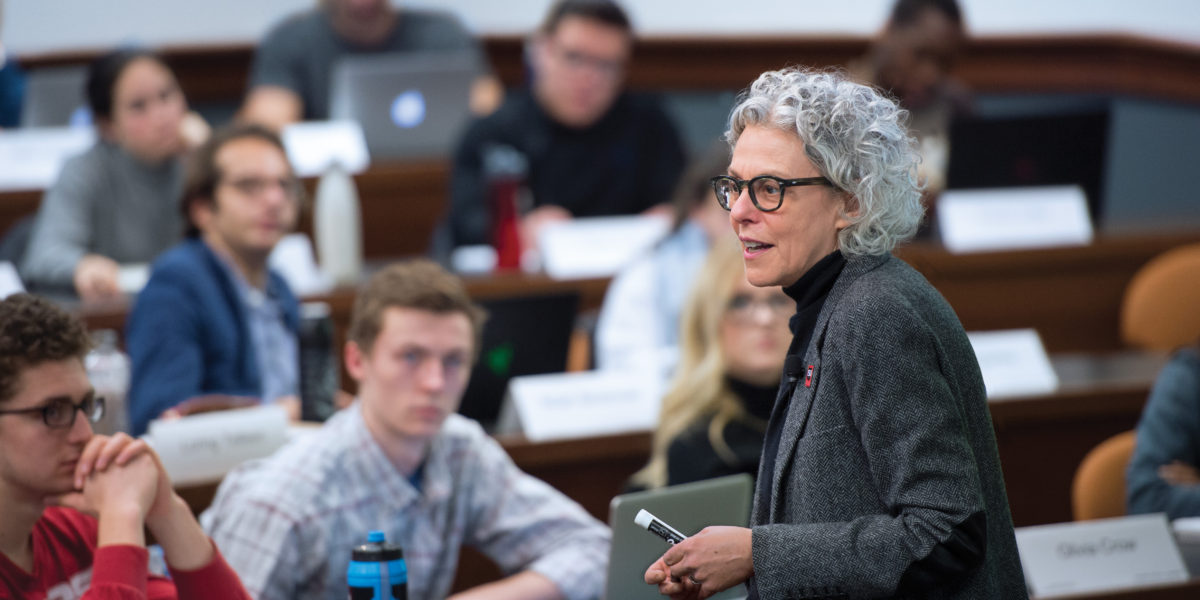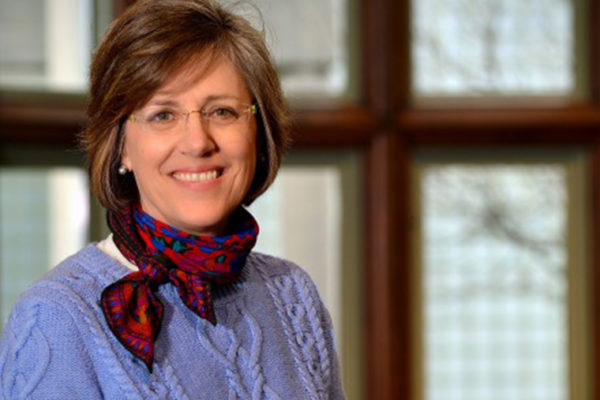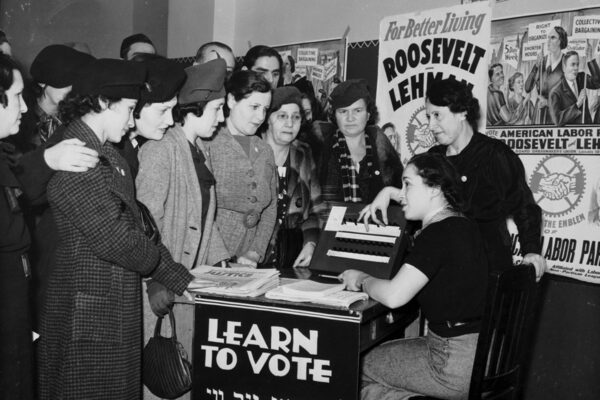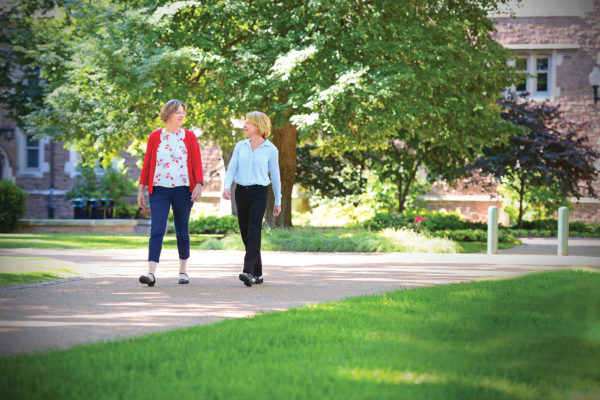At 9 on a Sunday morning, Professor Lee Epstein strides into one of the classrooms that rim the law school’s courtyard. All three tiers are filled with students, and not one is yawning or slouching. This is day three of Epstein’s three-day course on the Roberts court, which she team-teaches with Adam Liptak, who covers the Supreme Court for The New York Times.
Epstein, a political scientist who holds the Ethan A.H. Shepley Distinguished University Professorship, doesn’t look all that intimidating in her gray tweed jacket and black turtleneck sweater. But she’s a lean compression of energy, her gaze intent behind the trademark dark-framed glasses.
She grins at the students and, without pausing for chitchat, projects data on the classroom screens showing the past 13 presidents’ win rates in the Supreme Court. “I was quite stunned when I saw this,” Epstein says. “Do you see a pattern in these data?”
After a few seconds, a student’s hand goes up: “I see a general decline since Reagan.”
“Yes. Look at that drop-off,” Epstein responds. “Obama has the worst record [just over 50 percent wins] of any president probably since the Zachary Taylor administration.”
“Why?” a student asks.
Epstein laughs. “I was going to ask you,” she says. “There’s a lot of argument for some ideological or partisan explanation; the Roberts court is fairly conservative. But I don’t think ideology is telling the whole story of Obama. Anybody have other thoughts?”
“Maybe executive power is expanding, and it’s coming up against constitutional limits,” a student offers.
Epstein nods. “There may be some pushback against executive power. That’s a possibility,” she says. “There’s another possibility: Why do we think the Office of the Solicitor General [which represents the president in the Supreme Court] did so well for so many years?”
The tide changed after President Reagan, Epstein says. Before that, the solicitor general’s office was tough to beat — especially since opposing counsel were often trying their first Supreme Court case. In recent years, though, lawyers who clerked for the Supreme Court or for the Office of the Solicitor General have gone on to join Supreme Court specialty groups at top law firms — and then have returned to argue against the solicitor general.
“With the emergence of this Supreme Court bar, the other side has gotten really good,” Epstein says in summary. “By 2007, less than half of the attorneys are making their first Supreme Court appearance, and many are former Supreme Court clerks who have argued five, 10 times in the court.”
A student asks what triggered the shift.
“Good question,” Epstein says. “It starts with Rex Lee, one of Reagan’s solicitor generals. He somehow got the idea to start a specialized Supreme Court practice in one of the big firms, way back in 1985.” Epstein gestures to the screen projecting her data. “Think about when the solicitor general’s success rate starts to drop.”

She plays a Reuters video, “The Echo Chamber,” describing a study of Supreme Court cases between 2004 and 2013. “A tiny group of lawyers has been emerging as first among equals,” the narrator says: Only 66 lawyers — less than 1 percent of all those who filed cases — took part in about 43 percent of the cases. Nearly all of them had clerked for either the solicitor general’s office or the Supreme Court itself.
“John Roberts was one of these attorneys,” Epstein tells the students. “He argued 39 cases and had an unbelievable success rate.
“These lawyers mostly represent business,” she adds, “and because they’re so good, business is doing really well in this Supreme Court. Somebody has called it Supreme Court Inc.” (Epstein recently collaborated with a law professor and a federal appeals court judge to rank all 35 Supreme Court justices from 1946 to 2011 for their “friendliness to business.” Roberts ranked second.) She puts up a chart of decisions that were unanimous in favor of business. “Even the Democrats on the court, who you think are liberal types, are supporting business more than Republicans in any prior year.”
Explaining judicial behavior
With all her number-crunching and historical comparisons, you’d expect Lee Epstein to be a nerd, but she’s cosmopolitan and fun, with a ready warmth. And she cares about good food and wine, and she’ll groan about her independent-minded Welsh terrier’s antics. Still, you get the feeling that the laser focus never dims, that she even dreams smart.
We meet for lunch at the university’s Whittemore House. She orders fast — this is not a woman who fusses or dithers — then steadily answers one question after another, making what is complicated clear. Her specialty is “judicial behavior,” meaning she looks at what kinds of cases the Supreme Court takes, how the justices vote and why, to what extent ideology drives them, how loyal they are to the president who appointed them.
“I was surprised we even found a loyalty effect,” she admits. In her book Advice and Consent: The Politics of Judicial Appointments, Epstein noted that justices tend to reflect the philosophies of the presidents who appointed them, at least for the first decade they’re on the court. There’s no need to curry favor; the justices have lifelong tenure. “Maybe it’s just human nature,” she suggests.
Human nature has figured large in her study of the court.
“It’s pretty universal that the judges’ political values come into play in their decisions,” Epstein says. “And because they have life tenure, they’re more likely to act on their values.” In her opinion, “it’s probably time to think about term limits for justices, or at the very least a mandatory retirement age.” Countries that don’t have term limits usually have mandatory retirement; the U.S. has neither. “I’m probably in favor of one 18-year, nonrenewable term,” she says. “With no regular turnover, every time a justice retires or dies, the confirmation battles are epic.”
A statistical model she made in 2005 showed confirmation hearings as increasingly polarized over ideology. The importance of nominees’ qualifications hasn’t changed since 1935, her starting point, but ideology began to play a larger role in the 1950s, and the polarization she identified has only intensified over the past decade.
“Conservative judges will uphold conservative laws and invalidate liberal laws, and vice versa. It’s a commitment to ideology, not activism versus restraint.”
— Lee Epstein
It’s even brought its own vocabulary: the phrase “judicial activism,” for example, which Epstein finds “pretty meaningless. People think of ‘activist judges’ as liberals who strike down or overturn laws. And they tend to characterize conservatives as restrainists. Not so,” she says. “Conservative judges will uphold conservative laws and invalidate liberal laws, and vice versa. It’s a commitment to ideology, not activism versus restraint.”
Still, there are always ideological surprises: “Everybody expected [David] Souter to be a moderate conservative, and he turned out to be liberal-leaning. That’s the ‘No More Souters’ cry. And [Clarence] Thomas is much more conservative than people thought he’d be.”
The Roberts court “is a complicated court, an odd court in many ways,” Epstein says. “It’s actually very rare that all the liberals are Democratic appointees and all the conservatives are Republican appointees.” With the court split into red and blue blocs, she adds, it’s hard for Americans to have confidence in its judicial detachment. “When the public perceives the court as a political rather than a legal body, the public is less likely to support the court.”
Media influence has changed too. In the old days, she says that reporters had “subtle ways of rewarding certain decisions. But with the new media scattered all over cyberspace, there’s no dominant force.” Influence is fragmented, hard to isolate or predict.
She pauses, cocks her head. Someone at the table behind her is talking about Israel. “I try to teach there every year,” she says, “and there are interesting contrasts. I met with six or seven of the Israeli justices last year. They’re a little bit more relaxed than our justices. None of them were wearing ties, and their comments were unguarded.” She shrugs. “It’s a younger country, a younger court. They are still in the process of establishing their own legitimacy.”
Does our court lack humility?
She smiles. “I’m not sure. They are treated like gods here; the court has a very prominent place in American society,” Epstein says. There’s a great story about the Norwegian court (she also has an appointment at the University of Bergen), she says: “They were considering an important case, and the public was surveyed, and the court came out different from the public survey, and the chief justice actually went on television to explain why. Can you imagine John Roberts going on TV?”
The Brazilian high court debates on television; Epstein doesn’t see that happening here anytime soon either. “Frankly, I think our justices are worried about Colbert or some other talk-show host taking little sound bites. I also think they like their anonymity.”
After studying high courts around the world, Epstein says the U.S. Supreme Court justices “have a relatively low workload and a relatively high [number of] staff. And their opinions are long. They have gotten longer and longer because the justices are deciding fewer cases, so they have more time. And they have very good help and electronic databases.”
“Now they barely get to 70 [cases]. … But the court is an opaque institution. The justices don’t have to explain why they do or don’t take cases.”
— Lee Epstein
Why are they deciding fewer cases? “That’s a question nobody quite knows the answer to,” Epstein says. “At the turn of the last century, they were deciding well over 200 cases a year. Now they barely get to 70. The drop is very noticeable, and there’s been a ton of speculation. But the court is an opaque institution. The justices don’t have to explain why they do or don’t take cases.”
How does the court decide which cases to hear? “First, they get about 7,000 petitions, and the clerks go through them and write little memos. And the clerks have been trained to write, ‘Reject,’” Epstein says. “So a lot of it boils down to what the clerks are looking for.” Her analysis suggests that the clerks are looking for good lawyering: “If the feds or a superstar lawyer wants a case heard, that would up the chances.” They’re also looking for conflicts, she says, cases in which the lower courts have disagreed about a point of law. They want clean cases, so they don’t get mired in a procedural tangle. And they want cases for which there’s a good chance of an outcome that will satisfy them.
One of her recent papers analyzes the odds. “If there’s a certain set of factors present, they are going to take the case,” Epstein explains. “If there’s a question about whether the case is still a live controversy or whether they have jurisdiction, they are not going to take the case. And the cases in between are where politics will come into play.”
‘Driven by the data’
“There are people who, when they walk into a room, you can feel that they definitely have things under control; there’s a mastery there,” says Charlie Thau, Epstein’s teaching assistant. “She’s a commanding presence.” Thau, who took Epstein’s constitutional law class when he was a sophomore, is headed to Georgetown University’s law school in the fall. Not only is his mentor a pioneer in political science, using data to track patterns in judicial behavior, but she’s also taught him “the value of preparation.” He says, “She’s fair. She’s not trying to mess you up, but she expects her students to meet her halfway.”
Thau still remembers the first time she called on him cold and grilled him: The case was Marbury v. Madison. “It established the idea of judicial review, that the judiciary can declare actions by the government unconstitutional,” he says. “When she said my name, my legs were shaking. She asked about five questions, each more complicated than the last, drilling down.” He managed every answer. “It was one of the proudest moments of my academic life.”
Now, as one of her TAs, he’s a lot more relaxed. “She comes in seeming very serious, and her class can be intimidating, but she’s witty — dry and acerbic. She definitely knows how to draw out a joke.” Those jokes are at neither side’s expense, though: “You have no idea how she feels about what we’re discussing. She just wants to improve our critical thinking,” Thau says.

One of Epstein’s faculty colleagues, James L. Gibson, says that absence of ideology is important on two levels: First, she’s a university professor, so, of course, her entire career is devoted to seeking the truth. And second, “she is a political scientist, driven by the data.” (She co-directs the Center for Empirical Research in the Law; she’s received 12 grants from the National Science Foundation; and for the past 30 years, she’s been helping to build and maintain the U.S. Supreme Court Database, which contains the key facts of every case since 1791, an unprecedented resource for scholars, lawyers and journalists.)
“Our data don’t let us believe things that are not true,” says Gibson, who is the Sidney W. Souers Professor of Government. “We are always testing our own positions against the data, and that’s a humbling thing to do. It makes us less assertive about our opinions.”
Epstein is “intolerant of superficial arguments,” Gibson says. He’s studied the nation’s high court himself, but he’s wary about every detail when they talk: “She’ll correct me in a heartbeat. I have never known a person who knows as much about the Supreme Court — the personalities, the arcane institutions and rules, what’s on the docket.” Best of all, she’s a well-rounded scholar, he says, generous toward younger colleagues, patient with committee work and an excellent writer.
The 17 books she’s authored or co-authored have made indelible marks and won awards, including the Pritchett Award for the Best Book on Law and Courts and one from the American Political Science Association (APSA) for making a lasting impression on the field of law and courts. (The APSA also bestowed its Lifetime Achievement Award on Epstein.) And like her teaching, her writing is fed by her work on the Supreme Court Database; her statistical analyses of wins, traits and shifts; her interactions with judges worldwide; her attention to every detail of every U.S. Supreme Court justice’s mind and heart, values and temperament, past experiences and relationships, foibles and quirks.
Even in its highest expression, justice is a small, chosen group of men and women, their opinions shaped by far more than the law.
Jeannette Cooperman is a staff writer for St. Louis Magazine.



